Key takeaways:
- Assessment anxiety often arises from a fear of judgment and can lead to negative self-perception and isolation.
- Effective coping strategies include mindfulness, structured study plans, and sharing feelings with others for support.
- Personal experiences highlight the isolating nature of anxiety but emphasize the importance of connecting with others to manage stress.
- Techniques like visualization, self-affirmations, and balancing study with self-care can significantly reduce anxiety levels.
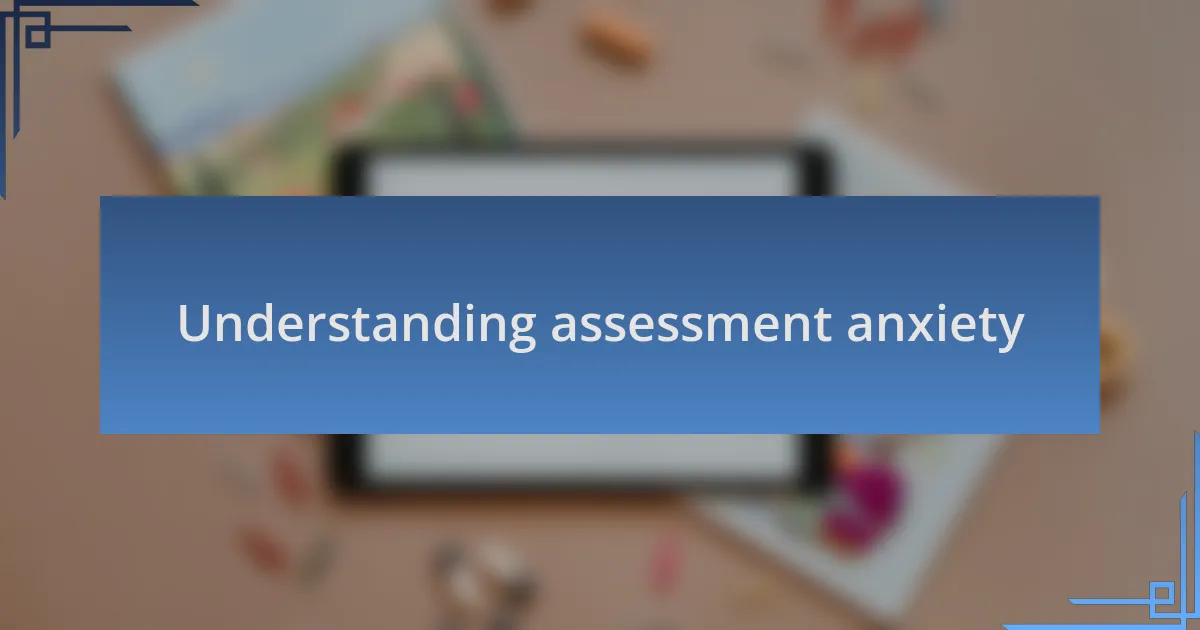
Understanding assessment anxiety
Assessment anxiety can feel like an overwhelming shadow looming over us during exams or evaluations. I remember sitting in a classroom, heart racing and palms sweating, as the clock ticked down. It made me question my abilities and left me wondering: Why does something meant to measure knowledge have the power to instill such fear?
Often, it seems that the pressure to perform can distort our capabilities. From my experience, the fear of failure morphs into a debilitating force, causing some to doubt their potential even before the assessment begins. Have you ever found yourself in a similar situation, feeling paralyzed by the weight of expectations?
Understanding assessment anxiety requires recognizing that it often stems from a deep-seated fear of judgment or imperfection. I’ve felt that gut-wrenching anxiety manifest in endless negative thoughts, whispering that I would never measure up. It’s crucial to unpack these feelings and realize that they do not define us, but rather, they highlight areas where we might need support or adaptive strategies.
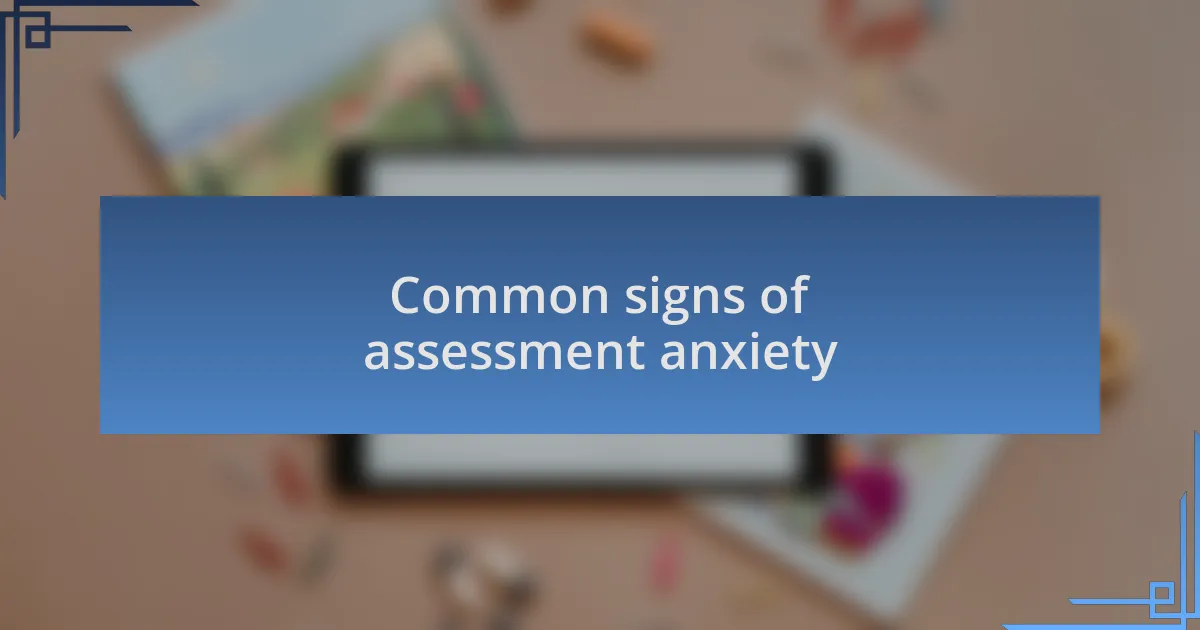
Common signs of assessment anxiety
Signs of assessment anxiety can manifest in various ways, often rooted in our emotional responses to the testing environment. I recall vividly the way my stomach would tie itself in knots before an exam, a physical reminder of the stress coursing through me. Have you ever felt that tension, that unmistakable signal that something is amiss long before you even opened the test paper?
Additionally, changes in behavior can be telling indicators of this anxiety. During a high-stakes evaluation, I would often isolate myself, avoiding study groups or discussions about the upcoming assessment. It’s almost as if I believed that distancing myself would somehow shield me from the pressure, but in reality, it only compounded my anxiety. I wonder how many people silently battle these feelings, thinking that isolating themselves is the best option.
Another sign to watch for is the tendency to overprepare or, conversely, to procrastinate completely. I once found myself buried in textbooks, convinced that relentless studying could somehow banish my fears. However, I also recall days when I chose to ignore the looming deadlines, hoping that avoidance would magically make the anxiety disappear. Isn’t it interesting how our coping mechanisms can often work against us, pushing us further into a cycle of anxiety rather than alleviating it?
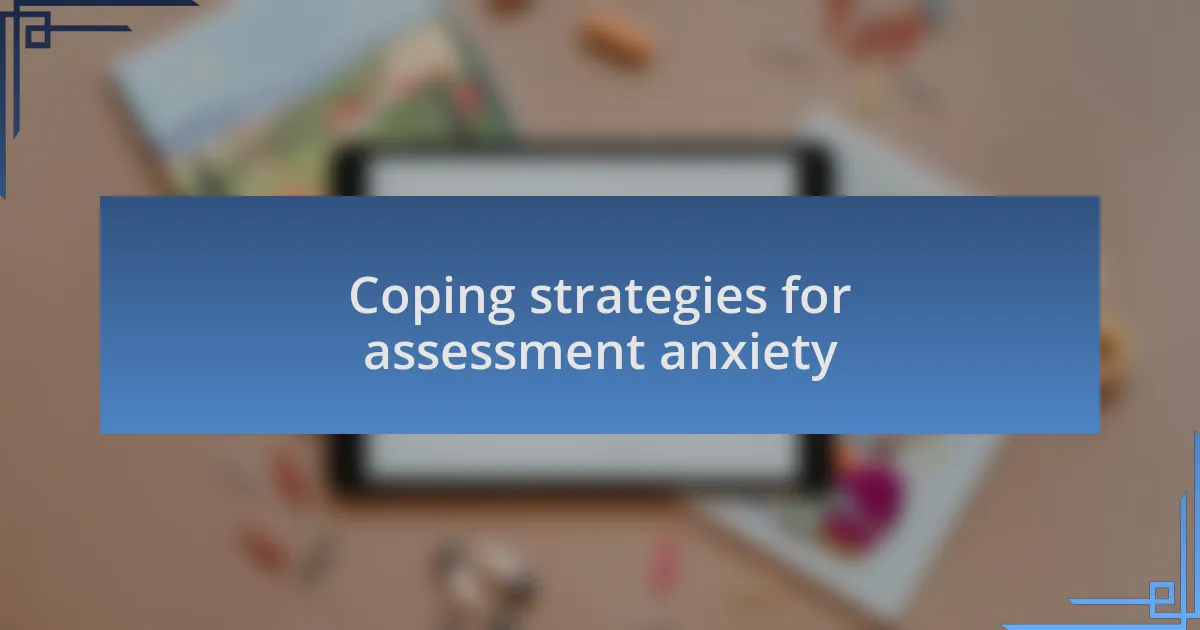
Coping strategies for assessment anxiety
Finding coping strategies for assessment anxiety can make a significant difference, and I’ve learned a few that truly work. One technique that helped me immensely was practicing mindfulness and deep breathing exercises. I remember sitting in my car before an exam, closing my eyes, and taking slow, deliberate breaths. It was amazing how such a simple practice helped ground me in the moment, easing that overwhelming anxiety that threatened to cloud my mind. Have you ever tried just taking a moment to breathe?
Another strategy involved creating a structured study plan. I used to feel crushed by the sheer volume of material I needed to cover, leading to panic. One day, I decided to break everything into smaller, manageable chunks and set specific goals for each study session. This approach not only organized my thoughts but also built my confidence as I ticked off each task. Might a structured plan reduce those anxiety-deep stress levels for you as well?
Lastly, I found that talking about my feelings with a trusted friend helped immensely. There were days when it felt as if that anxiety bubble would burst inside me, but sharing my thoughts not only provided relief but also a sense of camaraderie. Often, they would share their own struggles, and that realization that I wasn’t alone in feeling this way truly lightened the load. Isn’t it empowering to connect with others over shared experiences?
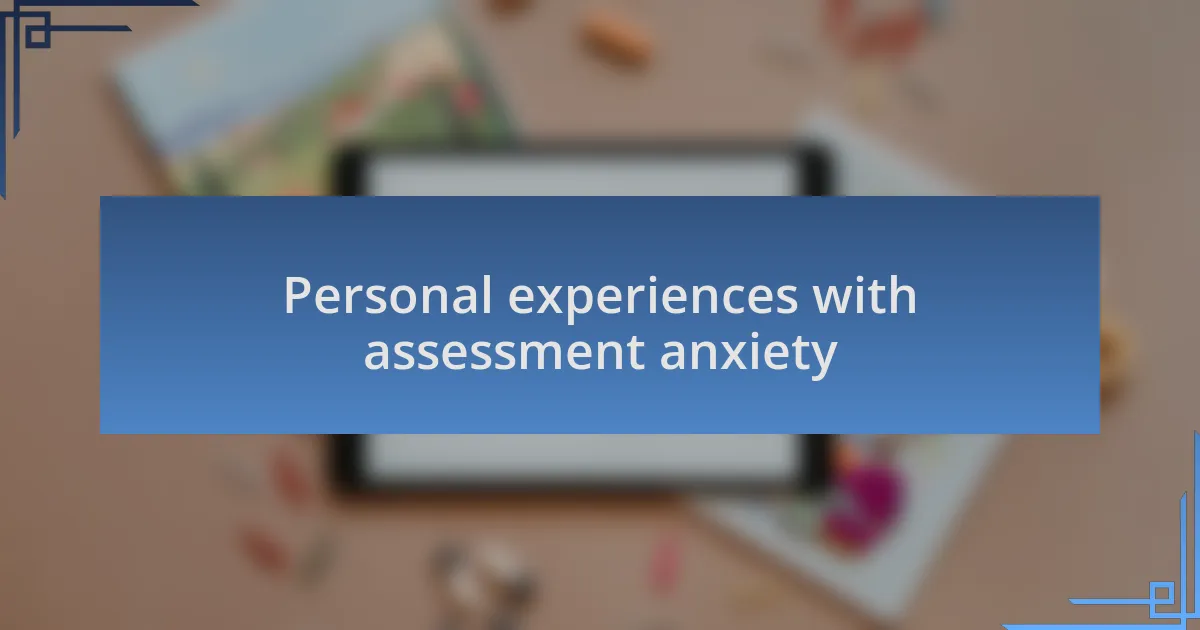
Personal experiences with assessment anxiety
Assessment anxiety has shaped many of my educational experiences. I vividly recall one exam day when my heart raced so fast that it felt like a wild drumbeat in my chest. Just moments before I sat to take the test, it struck me how much pressure I put on myself to perform well. Did you ever feel that weight of expectation? I did, and it was suffocating.
I remember a time in high school when I bombed a particularly tough math exam. I had studied diligently, but the moment I received the test paper, panic swept over me. It felt as if all the knowledge I had crammed into my brain evaporated. I left the classroom feeling defeated, like I had let everyone down, including myself. Have you ever felt that crushing disappointment in a moment of high stakes? It was a turning point for me, igniting a desire to find ways to combat that paralyzing fear.
Reflecting on these moments, I’ve realized just how isolating assessment anxiety can be. Despite being surrounded by classmates, it often felt like I was in my own bubble of stress and worry. I began seeking out support, realizing that sharing my fears with others made them feel more manageable. Have you ever reached out to someone and found solace in their understanding? For me, these connections became a lifeline, transforming my experience from one of solitude to shared understanding.
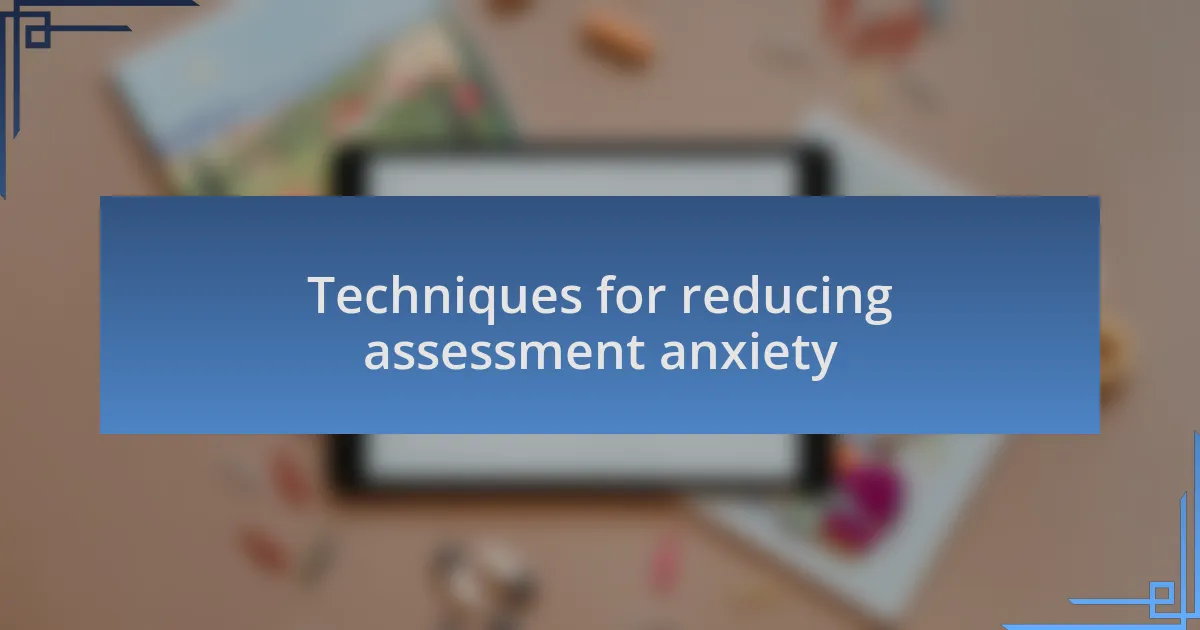
Techniques for reducing assessment anxiety
Finding effective techniques to manage assessment anxiety has been a game-changer for me. One method I discovered is visualization, where I would imagine myself walking into the exam room, feeling calm and collected. It’s amazing how picturing success can transform the way I approached a test – did you know that mental rehearsal can actually boost confidence?
Another strategy that truly helped was practicing mindfulness. In the days leading up to an assessment, I set aside a few minutes each day to focus on my breathing and let go of racing thoughts. This simple act grounded me, providing clarity and reducing feelings of overwhelm. Have you ever tried just taking a moment to breathe deeply when anxiety starts bubbling up? It can create an instant sense of peace, making the looming test feel less daunting.
Lastly, I learned the importance of preparation, but not just in the academic sense. I found that developing a study routine that included breaks and physical activity allowed me to absorb information better while also lowering my anxiety. It’s interesting how nurturing my body and mind collectively can alter my mindset about assessments. How do you balance studying with self-care? I’ve realized that it’s all about creating harmony between work and relaxation to face challenges with confidence.
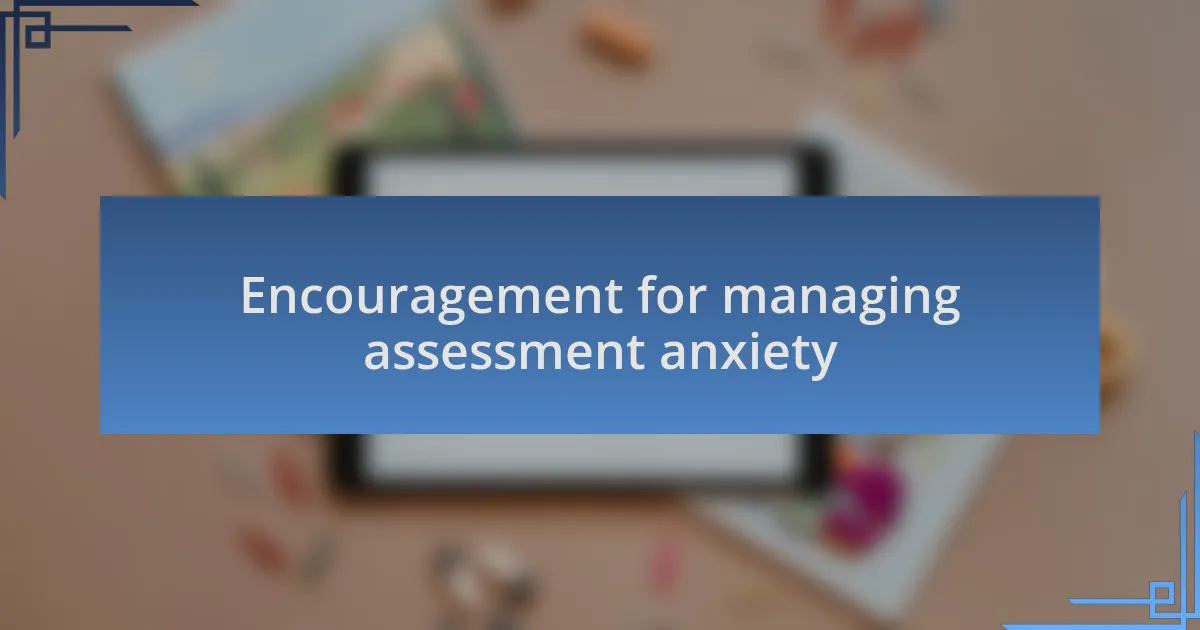
Encouragement for managing assessment anxiety
When it comes to managing assessment anxiety, I’ve often found that surrounding myself with positive influences makes a significant difference. On days when I felt particularly nervous, I would reach out to friends or family who uplifted me with their encouragement. Have you ever noticed how a few kind words can shift your entire mood? It’s as if their belief in my abilities sparked a fire within me, reminding me that I wasn’t alone in this journey.
Another technique that worked wonders for me was integrating self-affirmations into my daily routine. I remember standing in front of the mirror, repeating phrases like “I am prepared” or “I can handle this” with conviction. It felt a bit awkward at first, but with time, these affirmations became a source of strength. Have you considered how powerful our self-talk can be? It’s fascinating how reshaping negative thoughts can not only ease anxiety but also build a stronger foundation for confidence.
Finally, I realized the effectiveness of sharing my feelings about test anxiety. Once, during a study group, I opened up about my jitters, and to my surprise, many others felt the same way. It was comforting to know I wasn’t the only one experiencing this. Isn’t it amazing how vulnerability can foster connection? By discussing our fears, we can create a supportive environment that encourages everyone to thrive, transforming anxiety into collective motivation.